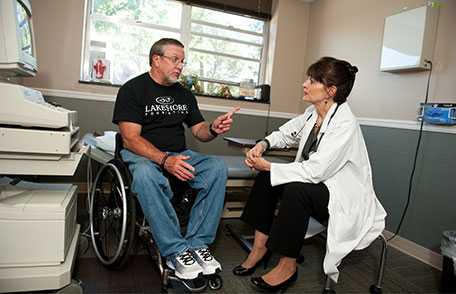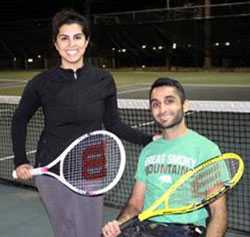The Prescription to a Healthy Life for All

Everybody needs physical activity for good health. However, nearly half of adults with disabilities who are able to participate in physical activity don’t get any. Doctors and other health professionals can help increase physical activity among people with disabilities.
Physical activity is important for everyone, including people with disabilities. According to the 2008 Physical Activity Guidelines for Americans, physical activity can help control weight, improve mental health, and lower the risk for early death, heart disease, type 2 diabetes, and some cancers. For people with disabilities, being active also can help increase independence. All adults need regular physical activity and should get at least 2-and-1/2 hours of aerobic physical activity each week at a moderate-intensity level. Aerobic physical activity is when the body’s large muscles move in a rhythmic manner for a sustained period of time, thus improving heart and lung fitness; examples include walking, running, swimming, and bicycling.
In the United States, about 1 in 5 people have a disability. A disability is any condition of the body or mind that makes it more difficult for the person with the condition to do certain activities and interact with the world around them. Disability does not equal poor health, and most adults with disabilities are able to participate in regular physical activity and avoid being inactive. However, nearly half of all adults with disabilities don’t get any aerobic physical activity.
Take a pledge to talk about physical activity with your patients with disabilities.
Pledge to Talk About Physical Activity
People with disabilities are more likely to be physically active if their doctors recommend it. However, not all patients with disabilities receive a physical activity recommendation from their doctor. CDC partnered with the National Center on Health, Physical Activity and Disability (NCHPAD) to encourage doctors and other health professionals to “take a pledge to talk about physical activity” with their patients with disabilities. Since the launch of this campaign, many healthcare providers have taken the pledge and are proud to be contributing to the health and well-being of people with disabilities. You can be one of them.
Dr. Hammad Aslam’s Story
Dr. Hammad Aslam has always been a goal-oriented person. In May 2009, shortly after his college graduation, he had his sights set on medical school, but was involved in a car accident that caused a spinal cord injury and paralysis from the chest down.
But with the help of his family and friends and a year of intensive rehabilitation, Hammad was able to get himself to a place where he could live independently and resume his plan to attend medical school at the Georgia Regents University. He received this medical degree in 2014 and is now specializing in physical medicine and rehabilitation.

“I think it’s very important to take the time to talk with my patients about exercise.” – Dr. Hammad Aslam
Hammad’s disability has had an impact on his life, but it hasn’t kept him from living a full and active life. So when he’s not making rounds at the hospital, Hammad takes advantage of the exercise facilities at Lakeshore Foundation. “Staying physically fit as a wheelchair user is incredibly important, since we’re prone to shoulder and overuse injuries,” the doctor says. “I do a lot of stabilization and strengthening exercises now. I feel like my shoulders are healthier now than they were before my injury.”
Advising his patients to be active is also a priority. “I think it’s very important to take the time to talk with my patients about exercise,” says Hammad. “Sometimes it’s tough to find time during appointments, but it’s worth it. It should become as universal as talking about tobacco or drug use. Talking with patients about their barriers to exercise and helping them to talk through goals also helps us develop a better relationship; I love to hear about their progress! Exercise can be such an important way we can all improve our health. The best part is that by being active I show them that I’m not a hypocrite, and I follow that advice myself.”
Doctors and other health providers can visit the National Center on Health, Physical Activity and Disability (NCHPAD) website and make talking about physical activity a priority.
What CDC and Our National Programs Are Doing
CDC’s Disability and Health Brach at the Division of Human Development and Disability supports and provides funding for two National Centers on Disability that focus on improving the quality of life for people living with disabilities, including their physical activity:
- National Center on Health, Physical Activity, and Disability (NCHPAD)
- Special Olympics Healthy Athletes Program
The Division also supports 19 state-based programs to:
- Promote equal access to opportunities for optimal health,
- Prevent long-standing diseases, like diabetes, heart disease, asthma, and arthritis, and
- Increase the quality of life of people with disabilities.
Learn more about the State Disability and Health Programs.
- Page last reviewed: May 15, 2017
- Page last updated: May 15, 2017
- Content source:
- National Center on Birth Defects and Developmental Disabilities
- Page maintained by: Office of the Associate Director for Communication, Digital Media Branch, Division of Public Affairs




 ShareCompartir
ShareCompartir